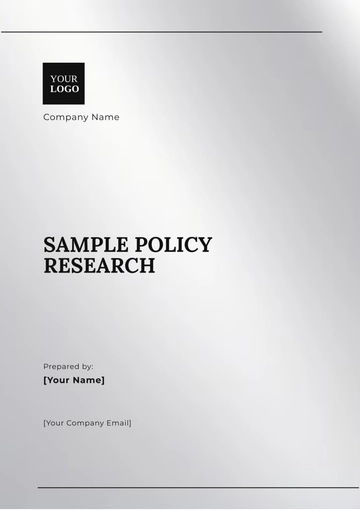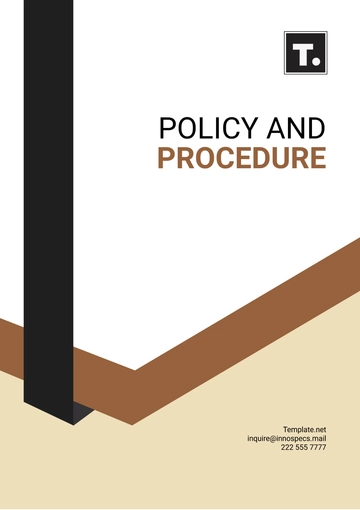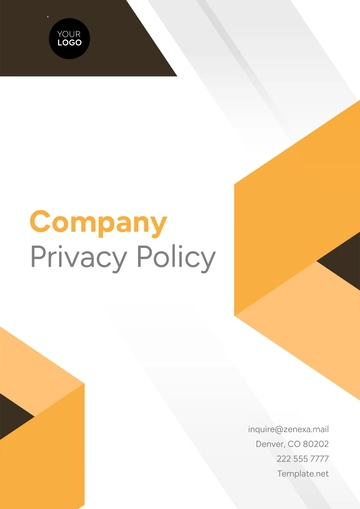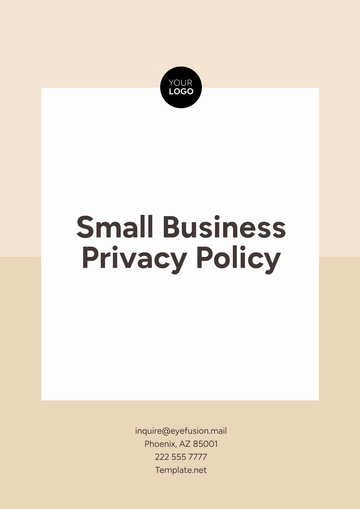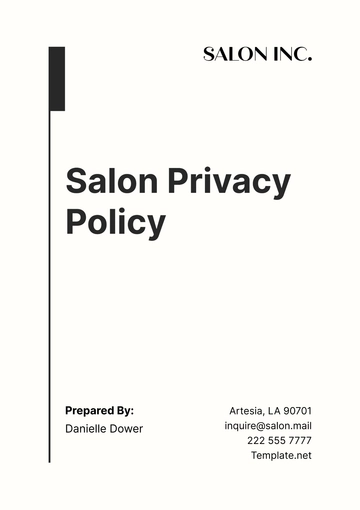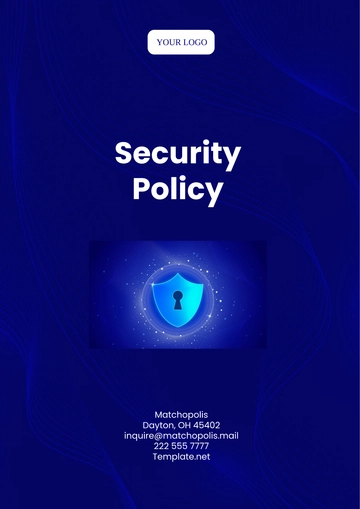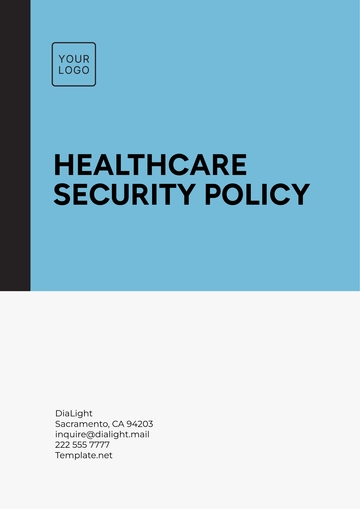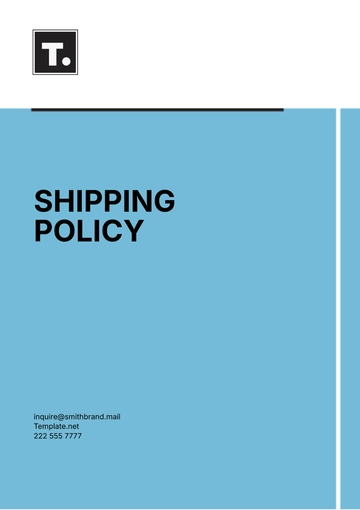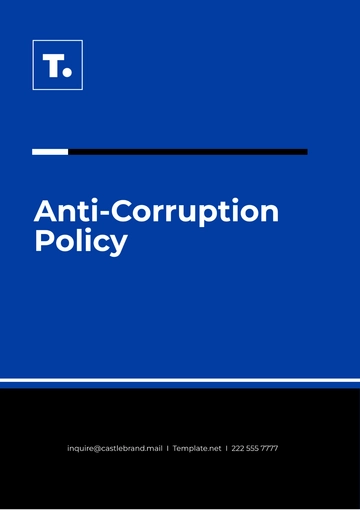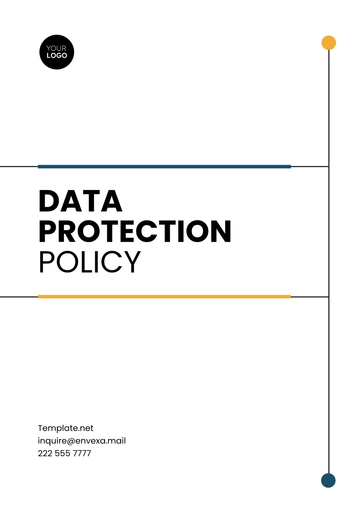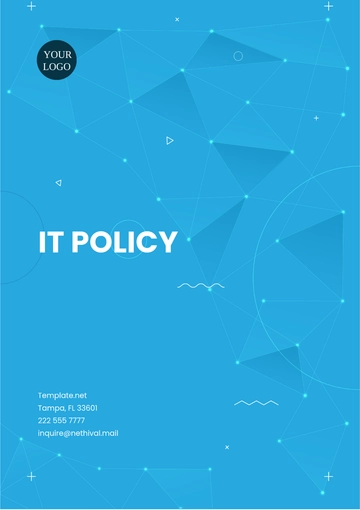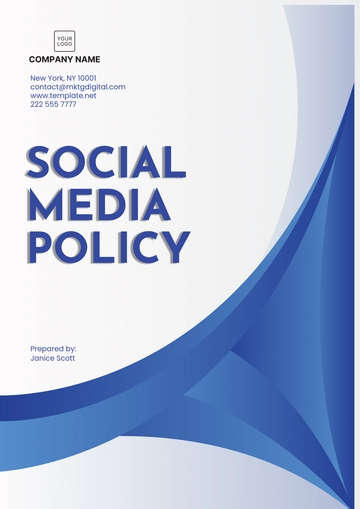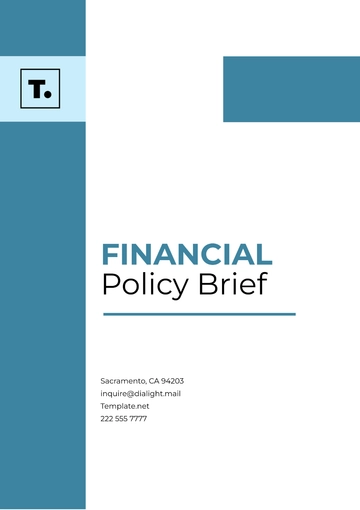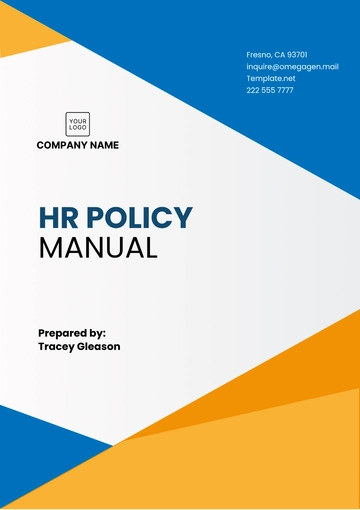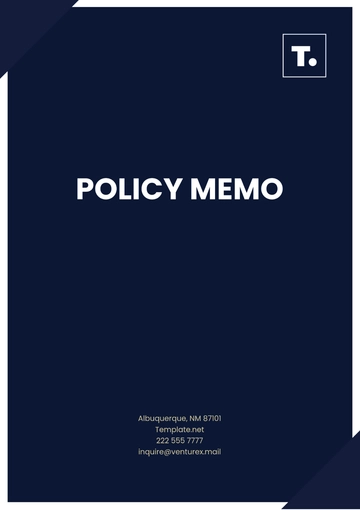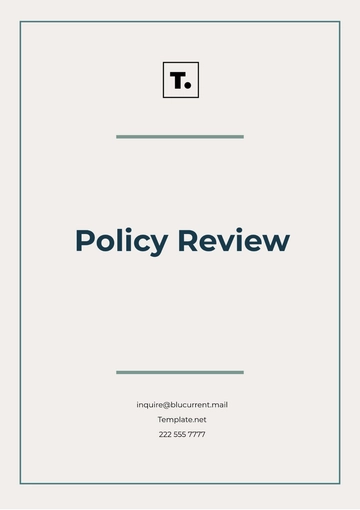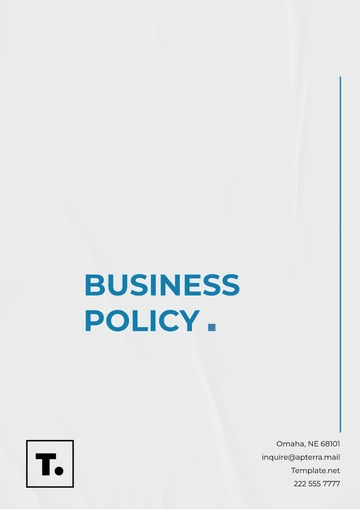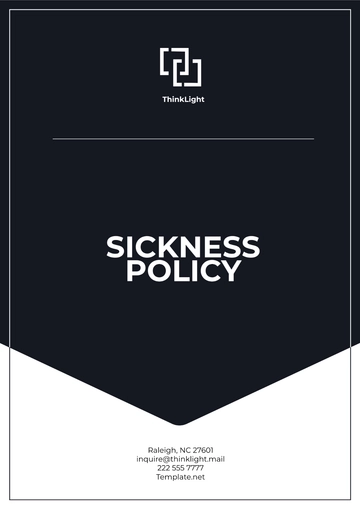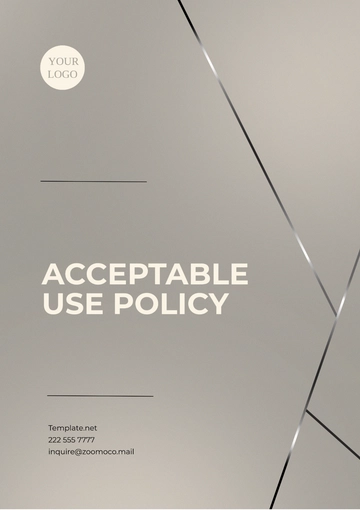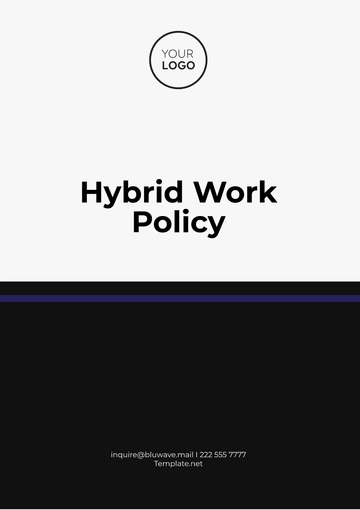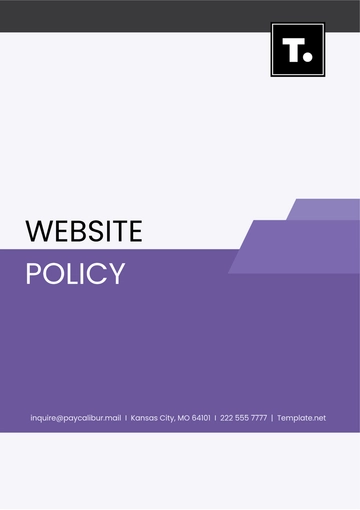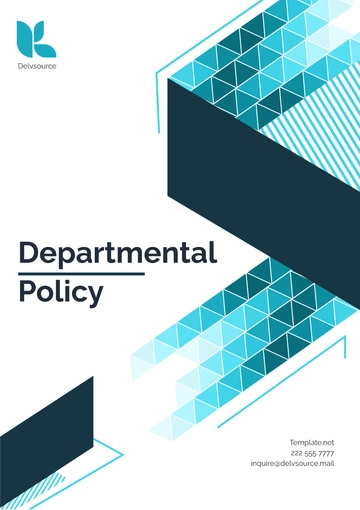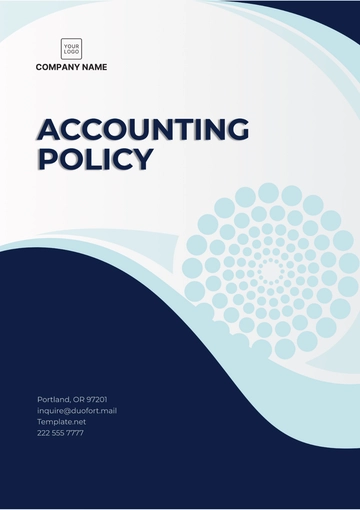Free Board of Director Ethics Policy

I. Introduction
This ethics policy serves as a guiding framework for the board of directors to uphold the highest standards of integrity, fairness, and accountability. It sets clear expectations for behavior, decision-making, and corporate governance, ensuring that [Your Company Name] remains a trusted organization. This document outlines the ethical principles and practices that will guide the board's actions and decisions, fostering a culture of transparency and respect.
II. Conflict of Interest
Managing conflicts of interest is critical to maintaining trust and impartiality in decision-making. This section provides guidelines to identify, disclose, and address conflicts that may arise in board activities.
Definition of Conflict of Interest: A conflict arises when personal interests interfere with board responsibilities. Examples include financial interests in competitor companies or favoritism in vendor selection.
Disclosure Requirements: Board members must disclose any potential or actual conflicts of interest. Transparency in disclosures ensures fair evaluations.
Resolution of Conflicts: When conflicts arise, the board will determine appropriate actions, such as recusal from related decisions. This ensures impartiality and fairness.
Regular Monitoring: Periodic assessments will be conducted to identify potential conflicts before they escalate. Proactive measures will prevent reputational damage.
Training on Conflicts: Board members will receive regular training on identifying and managing conflicts of interest. This strengthens awareness and compliance.
III. Code of Conduct
A comprehensive code of conduct establishes clear expectations for behavior and decision-making by the board of directors. This ensures that all actions are consistent with the company’s ethical values.
Professionalism: Board members are expected to act with professionalism and respect in all interactions. This fosters a positive and productive work environment.
Integrity: Honesty and integrity should underpin all board actions. This includes avoiding fraudulent activities and upholding the company’s interests.
Confidentiality: Board members must protect sensitive company information. Unauthorized disclosures can harm the company's reputation and operations.
Compliance with Laws: Adherence to all applicable laws and regulations is mandatory. This reinforces the board’s commitment to ethical governance.
Zero Tolerance for Discrimination: The board will maintain a zero-tolerance policy for discrimination and harassment. This commitment ensures a respectful and inclusive workplace.
IV. Reporting and Whistleblower Protection
Encouraging transparent reporting and protecting whistleblowers are essential to enforcing the ethics policy. This section outlines how board members can report concerns and how the company will protect them.
Reporting Mechanisms: A secure and anonymous reporting system will be available to board members and employees. This encourages open communication without fear of retaliation.
Protection for Whistleblowers: Whistleblowers will be safeguarded against retaliation. This includes protection from termination, demotion, or harassment.
Investigation Processes: All reports will be thoroughly investigated by an impartial team. This ensures fairness and objectivity in addressing concerns.
Transparency in Outcomes: The board will communicate the outcomes of investigations to relevant parties. Transparency builds trust in the reporting system.
Encouraging a Speak-Up Culture: Regular training and awareness programs will foster a culture where reporting concerns is normalized.
V. Ethical Decision-Making Framework
A structured framework supports consistent ethical decision-making by the board. This framework ensures consistency and alignment with company values. It supports thoughtful, principle-driven decisions that consider all stakeholders.
Step | Description | Example Scenario |
|---|---|---|
Identify the Issue | Determine the ethical dilemma or decision required. | Deciding on executive bonuses during layoffs. |
Assess Impacts | Evaluate potential impacts on stakeholders and operations. | Bonuses could harm morale among remaining staff. |
Consider Principles | Align the decision with the company’s ethical values. | Prioritize fairness and transparency. |
Explore Options | Identify alternative solutions to the dilemma. | Postpone bonuses or implement company incentives. |
Decide and Act | Make the final decision and communicate it effectively. | Announce postponement with rationale. |
VI. Stakeholder Engagement
Engaging with stakeholders fosters trust and collaboration. This section outlines the board’s responsibility to communicate and collaborate with stakeholders transparently and ethically.
Defining Stakeholders: Stakeholders include employees, investors, customers, and the community. Each group has unique concerns and interests.
Communication Practices: Open and honest communication builds trust. Regular updates on board decisions will be provided through newsletters and reports.
Feedback Mechanisms: Stakeholders will have opportunities to share their concerns. This feedback informs the board’s decision-making.
Collaborative Initiatives: Partnering with stakeholders on sustainability and community projects strengthens relationships. These initiatives align with the company’s ethical goals.
Measuring Engagement Effectiveness: Regular surveys will assess stakeholder satisfaction with board communication and collaboration.
VII. Compliance Monitoring
Ensuring compliance with the ethics policy is essential for its effectiveness. Improvements in policy awareness and reduced whistleblower cases reflect progress in building an ethical culture. Conflict disclosure tracking needs enhancement to ensure transparency.
Metric | Current Status | Target | Improvement Plan |
|---|---|---|---|
Policy Awareness | 75% | 90% | Conduct training sessions. |
Whistleblower Cases | 15 | <10 | Enhance reporting mechanisms. |
Conflict Disclosures | 20 | 25 | Improve disclosure tracking. |
VIII. Continuous Improvement
An effective ethics policy evolves with the company and external environment. This section focuses on mechanisms for updating the policy and enhancing its application.
Annual Reviews: The policy will be reviewed annually to address emerging ethical challenges. Feedback from board members and stakeholders will guide updates.
Benchmarking Best Practices: Regular comparisons with industry standards ensure the policy remains relevant. This helps maintain a competitive edge in ethical governance.
Integration of Feedback: Feedback from whistleblowers, employees, and stakeholders will be incorporated. This ensures the policy addresses real-world concerns.
Monitoring Effectiveness: Periodic audits will assess the policy’s impact on the company’s operations and reputation. Findings will guide future improvements.
Adapting to Regulatory Changes: The policy will be updated promptly in response to new laws or regulations. This ensures compliance and reduces legal risks.
IX. Next Steps
To further solidify ethical practices, [Your Company Name] will focus on increasing awareness and adherence to the policy across the board. Upcoming initiatives include additional training, enhanced whistleblower protection mechanisms, and the integration of real-time reporting tools.
Policy Awareness Campaign: The company will launch an awareness campaign to ensure all board members understand the policy fully. This will include workshops and informational resources.
Improved Monitoring Tools: New digital tools will be implemented to track compliance and identify issues more effectively. This enhances accountability and responsiveness.
Stakeholder Collaboration: Regular meetings with key stakeholders will ensure their ethical concerns are addressed. This fosters trust and transparency.
Focus on Training: Comprehensive training sessions will be organized for all board members and senior management. This will reinforce the importance of ethical governance.
Evaluation of Policy Impact: The board will periodically assess the policy’s effectiveness and adjust strategies as needed. This ensures continuous alignment with ethical principles.
This Ethics Policy Template provides a robust framework to guide the board of directors at [Your Company Name] in maintaining the highest ethical standards. Regular stakeholder engagement sessions will also be scheduled to ensure alignment with ethical standards.
- 100% Customizable, free editor
- Access 1 Million+ Templates, photo’s & graphics
- Download or share as a template
- Click and replace photos, graphics, text, backgrounds
- Resize, crop, AI write & more
- Access advanced editor
Define standards with the Board of Director Ethics Policy Template from Template.net. Fully editable and customizable, this template is ideal for establishing ethical guidelines and responsibilities for board members. Personalize it quickly in our AI Editor Tool with your organizational values and details. Its structured design ensures transparency and professionalism.
You may also like
- HR Policy
- Restaurant Policy
- Company Policy
- Accounting Policies and Procedures
- Website Policy
- Privacy Policy
- Safety Policy
- School Policy
- IT and Software Policy
- Law Firm Policy
- Construction Policy
- Interior Design Policy
- Travel Agency Policy
- Education Academic Policy
- Security Policy
- Real Estate Policy
- Expense Policy
- Software Policy
